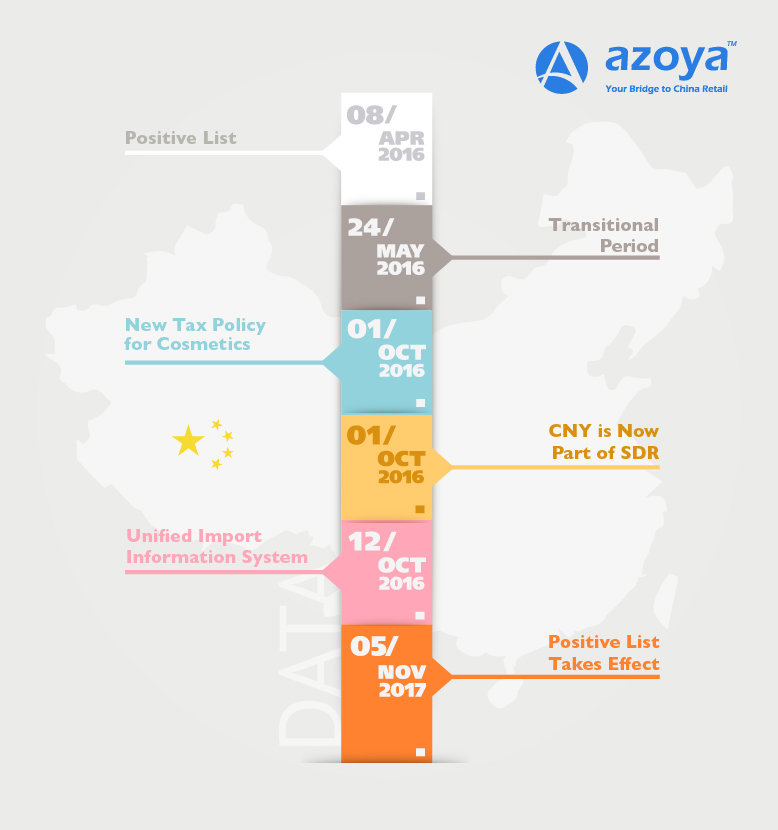Updates on 2016 Chinese E-Commerce Policies
Newly released Customs policy is a sign that Chinese government is attempting to regulate the emerging cross-border trade business. Is it a good thing or a bad thing?
by Azoya

As an emerging sector, cross-border e-commerce has gone through radical changes when Chinese Customs issues new policies. E-commerce businesses that relies on B2B2C bond import and B2C direct import were greatly impacted when ‘Positive List’ was first introduced by Customs on April 8 th. Since then, cross-border e-commerce sector has been referring the new policy as ’48 new policy’. Even when the announcement of a transitional period on May 24 didn’t thrill the industry, or in other words, it did not last long before they started to worry about survival after May 11, 2017, the day when ‘Positive List’ takes effect officially. Azoya had previously published a blog discussing the impacts of 'Positive List’ and here’s the portal to that article.
Yes, it is true that the rather barbaric cross-border e-commerce sector would gradually adjusts before finally taking shape. In the following passage, it will be discussing latest policies released by Chinese government and news that helps to understand Chinese market.
#1 May 24, 2016 Chinese Customs Announced Transitional Period Before Official Implementation of 'Positive List'
Until 11 May 2017 (that day included), "bonded imports" entering the bonded zones in the 10 cross-border e-commerce pilot cities will be exempted from checks of their Customs Clearance Certificates. Import permits, registration or filing will not be required for first-time imported cosmetics, baby formula, medical equipment and special food products (including health food products and food for special medical purposes).
Import permits, registration or filing requirements will also be exempted for ‘direct purchase imports’, including first-time imported cosmetics, baby formula, medical equipment and special food products.
The release of the transitional period does address to the problem that some imported commodities were unable to obtain first time import permits resulting in tons of imported goods stuck in bonded warehouse. Cross-border e-Commerce enterprises will be given one year of time to adjust to that. However, this doesn’t mean Customs gives green lights to all cosmetics, special foods, baby formula and such. Imported commodities are still regulated under previously effected rules, not to mentioned the various regulations each pilot city has.
#2 October 1, 2016 New Tax Policy for Cosmetic Products
China has announced that consumption tax for all cosmetic products are reduced or removed, effective immediately from 1st of October, 2016. Under the latest policy, consumption tax of cosmetic products with ex-VAT price below 10 RMB/ml (g) or 15 RMB/piece will be removed while products above the level will be defined as premium cosmetic products, subjected to 15% of consumption tax. This move aims to stimulate weak consumption of domestic products.
The release of new policy means that Chinese will be able to purchase high-quality domestic brands with much lower price. Imported cosmetic products will also saw tax reduction, however they will be facing fierce competition from domestic products. Margin still exists for most cross-border vendors, but they will need to put more effort in marketing.
#3 October 1, 2016 RMB Now Officially Becomes Global Reserve Currency
As of October 1, 2016, RMB is now included in the Global Reserve Currency, accounting for 10.9% of the value of the ‘special drawing right’ (SDR) basket. The SDR is an international reserve asset, which was created by the IMF in 1969 to supplement its member countries' official reserves. Its value is currently based on a weighted average of the values of a basket of 5 major currencies.
Even before October 1, news around RMB becoming a member of SDR has already been impacting lives of average Chinese people. Recent research has suggested continuing rise of RMB cross-border trade settlements. In the long run, this would mean that Chinese tourists will be benefited from increased convenience exchanging currencies overseas.
#4 October 12, Chinese Customs Launches Unified Import Information System
China Customs has launched a unified system to keep track of cross-border imports records. The system was already on trial earlier this year in a few pilot cities including Guangzhou and Tianjin. With the launching of this unified system, cross-border importers will need to submit digital information including orders, logistics, payments, etc. to the unified system to obtain clearance. This is a gesture of making future cross-border trades more transparent. The launching of this unified system reflects Chinese government’s continued effort to regulate the cross-border e-commerce sector.
Suggested Reading
Effective Date of Positive List Postponed to the End of 2017
3 Impacts of China's Positive List on Import eCommerce
Warehousing and Logistic Service